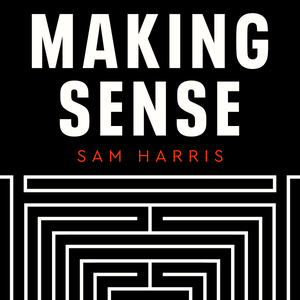
The Michael Shermer Show
Michael Shermer
- 1 hour 11 minutesHow Rhetoric Shapes Your Opinions
Robin Reames breaks down the major techniques of rhetoric, pulling back the curtain on how politicians, journalists, and “journalists” convince us to believe what we believe—and to talk, vote, and act accordingly.
Understanding these techniques helps us avoid being manipulated by authority figures who don’t have our best interests at heart. It also grants us rare insight into the values that shape our own beliefs.
Reames and Shermer discuss: rhetoric vs. facts (rhetorical truths vs. empirical truths) • the point of reason (to understand reality or to persuade?) • Canons of rhetoric: invention, arrangement, style, memory, delivery • bullshitters vs. liars • induction and deduction • rhetorical, ideological, and metaphorical thinking • how to debate contentious issues
Robin Reames is associate professor of English at the University of Illinois at Chicago, specializing in rhetorical theory and the history of ideas. Her new book is The Ancient Art of Thinking for Yourself: The Power of Rhetoric in Polarized Times.
SPONSOR: everything-everywhere.com
27 April 2024, 3:20 pm - 1 hour 23 minutesAccomplishment and Happiness (Adam Gopnik, The New Yorker)
We push ourselves toward the highest-paying, most prestigious jobs, seeking promotions and public recognition. As Adam Gopnik points out, the result is not so much a rat race as a rat maze, with no way out. Except one: to choose accomplishment over achievement.
Achievement is the completion of the task imposed from outside.
Accomplishment, by contrast, is the end point of an engulfing activity one engages in for its own sake.
Shermer and Gopnik discuss:
- mastering the secrets of stage magic (Gopnik's son worked with David Blaine and Jamy Ian Swiss)
- accomplishment in music
- family and mentors
- the concept of the 10,000-hour rule vs. natural talent
- Adam's new book All That Happiness Is, which offers timeless wisdom against the grain.
Adam Gopnik has been a staff writer at The New Yorker since 1986. He is the author of numerous best-selling books, including Paris to the Moon and The Real Work: On the Mystery of Mastery.
Sponor: brilliant.org/skeptic
23 April 2024, 1:33 pm - 1 hour 14 minutesShould We Prepare for Nuclear War? (Annie Jacobsen)
Pulitzer Prize finalist Annie Jacobsen investigated this ticking-clock scenario, based on dozens of exclusive new interviews with military and civilian experts who have built the weapons, been privy to the response plans, and are responsible for those decisions should they need to be made.
Shermer and Jacobsen discuss: surviving a nuclear explosion • what happens in a nuclear bomb explosion • consequences of a nuclear exchange • Getting to Nuclear Zero • North Korea, China/Taiwan • increasing budgets for more weapons • types and quantities of nuclear weapons • why humans engage in aggression, violence, and war
Annie Jacobsen is an investigative journalist, Pulitzer Prize finalist, and New York Times bestselling author. Her new book is Nuclear War: A Scenario. Her other books include: Area 51, Operation Paperclip, and The Pentagon’s Brain.
20 April 2024, 1:46 pm - 1 hour 45 minutesAn AI... Utopia? (Nick Bostrom, Oxford)
Nick Bostrom’s previous book, Superintelligence: Paths, Dangers, Strategies, changed the global conversation on AI and became a New York Times bestseller. It focused on what might happen if AI development goes wrong.
But what if things go right?
Bostrom and Shermer discuss: An AI Utopia and Protopia • Trekonomics, post-scarcity economics • the hedonic treadmill and positional wealth values • colonizing the galaxy • The Fermi paradox: Where is everyone? • mind uploading and immortality • Google’s Gemini AI debacle • LLMs, ChatGPT, and beyond • How would we know if an AI system was sentient?
Nick Bostrom is a Professor at Oxford University, where he is the founding director of the Future of Humanity Institute. Bostrom is the world’s most cited philosopher aged 50 or under.
16 April 2024, 6:25 pm - 1 hour 40 minutesLife on Mars? (Robert Zubrin)
When Robert Zubrin published his classic book The Case for Mars a quarter century ago, setting foot on the Red Planet seemed a fantasy. Today, manned exploration is certain, and as Zubrin affirms in The New World on Mars, so too is colonization. From the astronautical engineer venerated by NASA and today’s space entrepreneurs, here is what we will achieve on Mars and how.
Shermer and Zubrin discuss: why not start with the moon? • what it is like on Mars • whether Mars was ever like Earth • how much it will cost to go to Mars • how to get people to Mars • resources on Mars • colonization of Mars • public vs. private enterprise for space exploration • economics, politics, and government on Mars • lessons from the Red Planet for the Blue Planet • liberty in space.
Robert Zubrin is former president of Pioneer Astronautics, which performs advanced space research for NASA, the US Air Force, the US Department of Energy, and private companies. He is the founder and president of the Mars Society, leading the Society’s successful effort to build the first simulated human Mars exploration base in the Canadian Arctic.
13 April 2024, 5:46 pm - 1 hour 13 minutesRobots and the People Who Love Them
Shermer and Herold discuss: social robots, sex robots, robot nannies, robot therapists • flying cars, jetpacks and The Jetsons • Masahiro Mori • emotions, animism, mind • emotional intelligence • artificial intelligence • large language lodels • ChatGPT, GPT-4, GPT-5 and beyond • the alignment problem • robopocalypse • robo soldiers • robot sentience • autonomous vehicles • AI value systems, and their legal and ethical status.
Eve Herold is an award-winning science writer. She has written extensively about issues at the crossroads of science and society, including stem cell research and regenerative medicine, aging and longevity, medical implants, transhumanism, and robotics and AI.
9 April 2024, 5:45 pm - 2 hours 1 minuteThe Formation, Diversification, and Extinction of World Religions
Thousands of religions have adherents today, and countless more have existed throughout history. What accounts for this astonishing diversity?
This extraordinarily ambitious and comprehensive book demonstrates how evolutionary systematics and philosophy can yield new insight into the development of organized religion. Lance Grande―a leading evolutionary systematist―examines the growth and diversification of hundreds of religions over time, highlighting their historical interrelationships. Combining evolutionary theory with a wealth of cultural records, he explores the formation, extinction, and diversification of different world religions, including the many branches of Asian cyclicism, polytheism, and monotheism.
Lance Grande is the Negaunee Distinguished Service Curator, Emeritus, of the Field Museum of Natural and Cultural History in Chicago. He is a specialist in evolutionary systematics, paleontology, and biology who has a deep interest in the interdisciplinary applications of scientific method and philosophy. His many books include Curators: Behind the Scenes of Natural History Museums (2017) and The Lost World of Fossil Lake: Snapshots from Deep Time (2013). His new book is The Evolution of Religions: A History of Related Traditions.
6 April 2024, 7:00 am - 1 hour 29 minutesThe Wisdom and Wonder of Being Uncertain
In an era of terrifying unpredictability, we race to address complex crises with quick, sure algorithms, bullet points, and tweets. How could we find the clarity and vision so urgently needed today by being unsure? Uncertain is about the triumph of doing just that. A scientific adventure tale set on the front lines of a volatile era, this epiphany of a book by award-winning author Maggie Jackson shows us how to skillfully confront the unexpected and the unknown, and how to harness not-knowing in the service of wisdom, invention, mutual understanding, and resilience.
Long neglected as a topic of study and widely treated as a shameful flaw, uncertainty is revealed to be a crucial gadfly of the mind, jolting us from the routine and the assumed into a space for exploring unseen meaning. Far from luring us into inertia, uncertainty is the mindset most needed in times of flux and a remarkable antidote to the narrow-mindedness of our day. In laboratories, political campaigns, and on the frontiers of artificial intelligence, Jackson meets the pioneers decoding the surprising gifts of being unsure. Each chapter examines a mode of uncertainty-in-action, from creative reverie to the dissent that spurs team success. Step by step, the art and science of uncertainty reveal being unsure as a skill set for incisive thinking and day-to-day flourishing.
Maggie Jackson is an award-winning author and journalist known for her pioneering writings on social trends, particularly technology’s impact on humanity. Winner of the 2020 Dorothy Lee Book Award for excellence in technology criticism, her book Distractedwas compared by FastCompany.com to Silent Spring for its prescient critique of technology’s excesses, named a Best Summer Book by the Seattle Post-Intelligencer, and was a prime inspiration for Google’s 2018 global initiative to promote digital well-being. Jackson is also the author of Living with Robots and The State of the American Mind. Her expertise has been featured in The New York Times, Business Week, Vanity Fair, Wired.com, O Magazine, and The Times of London; on MSNBC, NPR’s All Things Considered, Oprah Radio, The Takeaway, and on the Diane Rehm Show and the Brian Lehrer Show; and in multiple TV segments and film documentaries worldwide. Her speaking career includes appearances at Google, Harvard Business School, and the Chautauqua Institute. Jackson lives with her family in New York and Rhode Island.
2 April 2024, 7:00 am - 1 hour 34 minutesThe End of Race Politics (Coleman Hughes)
As one of the few black students in his philosophy program at Columbia University years ago, Coleman Hughes wondered why his peers seemed more pessimistic about the state of American race relations than his own grandparents–who lived through segregation. The End of Race Politics is the culmination of his years-long search for an answer.
Coleman Hughes is a writer, podcaster and opinion columnist who specializes in issues related to race, public policy and applied ethics. Coleman’s writing has been featured in the New York Times, the Wall Street Journal, National Review, Quillette, The City Journal and The Spectator. He appeared on Forbes’ 30 Under 30 list in 2021.
Shermer and Hughes discuss: why he is considered “black” if he is “half-black, half-Hispanic” • what it means to be “colorblind” • population genetics and race differences • Base Rate Neglect, Base Rate Taboos • institutionalized neoracism • viewpoint epistemology • affirmative action • gaps in income, wealth, home ownership, CEO representation, Congressional representation • myths of Black Weaknes, No Progress, Undoing the Past • reparations • the future of colorblindness.
Contemplative yet audacious, his new book, The End of Race Politics, is necessary reading for anyone who questions the race orthodoxies of our time. Hughes argues for a return to the ideals that inspired the American Civil Rights movement, showing how our departure from the colorblind ideal has ushered in a new era of fear, paranoia, and resentment marked by draconian interpersonal etiquette, failed corporate diversity and inclusion efforts, and poisonous race-based policies that hurt the very people they intend to help. Hughes exposes the harmful side effects of Kendi-DiAngelo style antiracism, from programs that distribute emergency aid on the basis of race to revisionist versions of American history that hide the truth from the public.
Read Michael H. Bernstein's review of Coleman Hughes book, The End of Race Politics: Arguments for a Colorblind America: https://www.skeptic.com/reading_room/revisiting-colorblindness/
30 March 2024, 7:00 am - 1 hour 7 minutesHow to Repair America’s Broken Democracy
Order the Artificial Intelligence issue of SKEPTIC magazine at https://www.skeptic.com/magazine/archives/29.1/ (available in print or digital format).
Looking ahead to the 2024 election, most Americans sense that something is deeply wrong with our democracy. We face extreme polarization, increasingly problematic candidates, and a government that can barely function, let alone address urgent challenges. Maxwell Stearns has been a constitutional law professor for over 30 years. He argues that our politics are not merely dysfunctional. Our constitutional system is broken. And without radical reform, the U.S. risks collapse or dictatorship.
The Framers never intended a two-party system. In fact, they feared entrenched political parties and mistakenly believed they had designed a scheme that avoided them. And yet the structures they created paved the way for our entrenched two-party system. that now undermines our basic constitutional structures, with separation of powers and checks and balances yielding to hyper-partisan loyalties. Rather than compromises arising from shifting coalitions, we experience ever-widening policy swings in increasingly combative elections. This two-party stranglehold on our politics is exactly what the Framers feared.
To survive as a democracy, we must end the two-party deadlock and introduce more political parties. But viable third parties are a pipe dream in our system given the current rules of the game. Stearns argues that we must change the rules, amend the Constitution, and transform America into a parliamentary democracy.
Although difficult to do, Stearns explains why his specific set of proposals is more politically viable than other increasingly prominent reform proposals, which cannot be enacted, will not end our constitutional crisis, or both.
Maxwell L. Stearns is the Venable, Baetjer & Howard Professor of Law at the University of Maryland Carey School of Law. He has authored dozens of articles and several books on the Constitution, the Supreme Court, and the economic analysis of law.
26 March 2024, 7:00 am - 1 hour 8 minutesBad Therapy: Why the Kids Aren't Growing Up (Abigail Shrier)
In virtually every way that can be measured, Gen Z’s mental health is worse than that of previous generations. Youth suicide rates are climbing, antidepressant prescriptions for children are common, and the proliferation of mental health diagnoses has not helped the staggering number of kids who are lonely, lost, sad and fearful of growing up. What’s gone wrong with America’s youth?
In Bad Therapy, bestselling investigative journalist Abigail Shrier argues that the problem isn’t the kids—it’s the mental health experts. Drawing on hundreds of interviews with child psychologists, parents, teachers, and young people, Shrier explores the ways the mental health industry has transformed the way we teach, treat, discipline, and even talk to our kids. She reveals that most of the therapeutic approaches have serious side effects and few proven benefits. Among her unsettling findings:
- talk therapy can induce rumination, trapping children in cycles of anxiety and depression
- social Emotional Learning handicaps our most vulnerable children, in both public schools and private
- “gentle parenting” can encourage emotional turbulence – even violence – in children as they lash out, desperate for an adult in charge.
Mental health care can be lifesaving when properly applied to children with severe needs, but for the typical child, the cure can be worse than the disease. Bad Therapy is a must – read for anyone questioning why our efforts to bolster America’s kids have backfired – and what it will take for parents to lead a turnaround.
Abigail Shrier received the Barbara Olson Award for Excellence and Independence in Journalism in 2021. Her bestselling book, Irreversible Damage: The Transgender Craze Seducing Our Daughters (2020), was named a “Best Book” by the Economist and the Times. It has been translated into ten languages. Her new book is Bad Therapy: Why the Kids Aren’t Growing Up.
Shermer and Shrier discuss: Irreversible Damage redux: WPATH Files • what view this book for or against • what is the problem to be solved? • theories: coddling, social media, screen time, generations/life history theory • good and bad therapists and therapies • anxiety, depression, suicidal ideation, autism • ACE (Adverse Childhood Experience) • trauma, stress, PTSD • anti-fragility and resilience • Goodwill Hunting view of therapy • previous quack therapies and psychological pseudoscience that have plagued psychology and psychiatry.
23 March 2024, 7:00 am - More Episodes? Get the App
Your feedback is valuable to us. Should you encounter any bugs, glitches, lack of functionality or other problems, please email us on [email protected] or join Moon.FM Telegram Group where you can talk directly to the dev team who are happy to answer any queries.
 Into the Impossible With Brian Keating
Into the Impossible With Brian Keating
 Sean Carroll's Mindscape: Science, Society, Philosophy, Culture, Arts, and Ideas
Sean Carroll's Mindscape: Science, Society, Philosophy, Culture, Arts, and Ideas
 Quillette Podcast
Quillette Podcast
 The Origins Podcast with Lawrence Krauss
The Origins Podcast with Lawrence Krauss
 The Best of Making Sense with Sam Harris
The Best of Making Sense with Sam Harris
 Making Sense with Sam Harris
Making Sense with Sam Harris